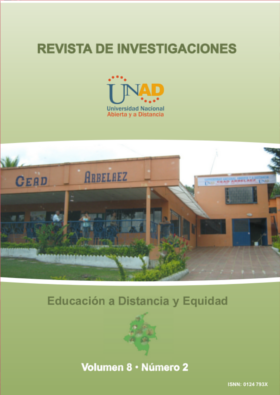Cuando la REVISTA DE INVESTIGACIONES UNAD recibe la postulación de un original por parte de su autor, ya sea a través de correo electrónico o postal, considera que puede publicarse en formatos físicos y/o electrónicos y facilitar su inclusión en bases de datos, hemerotecas y demás sistemas y procesos de indexación. REVISTA DE INVESTIGACIONES UNAD autoriza la reproducción y citación del material de la revista, siempre y cuando se indique de manera explícita el nombre de la revista, los autores, el título del artículo, volumen, número y páginas. Las ideas y conceptos expresados en los artículos son responsabilidad de los autores y en ningún caso reflejan las políticas institucionales de la UNAD
Los problemas de convivencia escolar: percepciones, factores y abordajes en el aula
This research was carried out in the Limbania Velasco Educational Institution, located in Santander de Quilichao, Cauca, Colombia, with students and group leaders of third grade, morning session, and eighth grade, afternoon session, during the 2008-2009 school year. The general goal was to analyze the factors which limit coexistence in schools with the purpose of validating psycho-social practices and strategies which promote satisfactory interpersonal relationships leading to a culture of peace in classrooms. A qualitative methodology was employed, based on active investigation on a sample of 159 students (79 from third grade and 80 from eighth grade). The research strategies include an institutional visit, observation of classroom, recess and playing environments, individual and group interviews, workshops, evaluation of classroom observers, and integration sessions or school retreats.
The results shows that teachers and students perceive coexistence inside their institution as positive but vulnerable to academic, family, social, interpersonal and disciplinary problems. In third grade classrooms, the need to expand opportunities for dialog, listening and participation among students was identified; in eighth grade classrooms, students relate coexistence with their daily experience; some consider it positive and others, negative; teachers point out the importance of addressing the attitudes and emotions of students. In conclusion, the problems of coexistence in schools are diverse, complex and dynamic. Approaching them from a psycho-social perspective implies examining human interaction in family and social contexts. The educational community develops both positive and negative strategies and actions which must be reflected on. Strategies exist for intervention in problems regarding personal and group attitudes, interpersonal communication, adequate conflict management and collaborative work.




